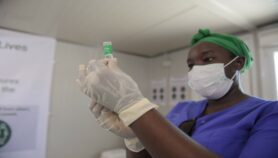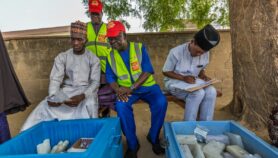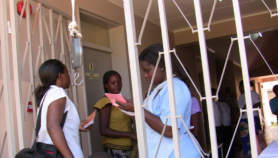By: Ochieng’ Ogodo
Send to a friend
The details you provide on this page will not be used to send unsolicited email, and will not be sold to a 3rd party. See privacy policy.
[ADDIS ABABA] Electronic data collection and management is crucial and could greatly lead to efficient and faster disease management and immunisation coverage in Africa, a conference has heard.
The Ministerial Conference on Immunisation in Africa taking place this week (24-25 February) in Addis Ababa, Ethiopia, aims to identify the continent’s achievements and challenges of attaining universal access to vaccines.
Orin Levine, director of vaccine delivery for the Bill and Melinda Gates Foundation, says that electronic data management could help scale up immunisation programmes beyond the present, especially for children.
“Many health managers in Africa do a lot of work with scarce resources, and this compromises quality and efficiency levels.”
Orin Levine, Bill and Melinda Gates Foundation
“Many health managers in Africa do a lot of work with scarce resources, and this compromises quality and efficiency levels,” he adds.
Shifting to electronic systems, he tells SciDev.Net, could greatly enhance data collection and the quality of data collected, make them easy to access and use as well as getting fast feedbacks, and ensuring that children still left out of vaccination programmes from preventable diseases are covered.
According to Levine, some African countries such as Rwanda have made strides in building electronic system but a lot still needs to be done in the ones currently relying heavily rely on paper works in collecting and keeping records on immunisation on preventable diseases such as polio, meningitis and measles.
Use of modern technologies such as geographical information system to capture, store, analyse, manage and present geographical data for diseases such as malaria, Levine says, could help countries design appropriate response strategies.
“These are good for issues such as accurate identification of the most vulnerable population and for rapid responses,” he explains.
Beyond mapping and easy access, electronic data collection and management could improve supply chain process by helping health institutions design innovative ways for procurement and distribution to meet the needs of the affected population, especially those in remote locations in scarce-resource settings.
He notes that although Ethiopia still largely uses paper registries, it has made commendable progress in immunisation coverage for children, adding that the biggest challenges facing countries depending on hard copies include lack of scale up and tracking adherence to vaccinations.
“You can imagine the enormous amount of energy that goes into paper works that are hard to navigate effectively for faster use on their immunisation programmes,” says Levine. “In some cases you have up 14 registries.”
“African leaders are here because they know that vaccines is one of the most cost-effective public health interventions of our time,” she tells SciDev.Net.
Moeti adds that Africa also needs accelerate research and development programmes in developing vaccines for the many diseases that affects its populace.
“For many decades there has been challenges but there is strong move now to invest in research and development on diseases such as malaria and meningitis,” she explains,, “We need to accelerate these [efforts].”
This piece was produced by SciDev.Net’s Sub-Saharan Africa English desk.














